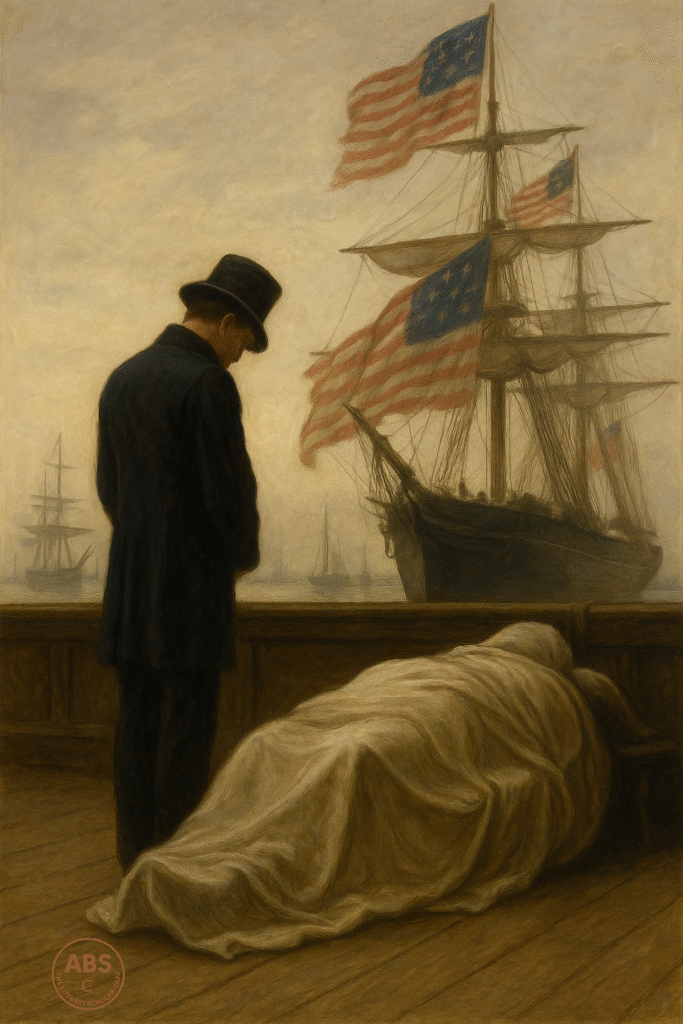A Poem That Cheers the End of the War and Then Weeps All Over the Deck
ABS Believes:
Grief doesn’t always scream—it sometimes comes in perfect rhyme and sea-washed uniform.
Nothing says “celebration” like your captain bleeding through the finale.
Walt Whitman: The Bard Who Loved America (and Grieved It Loudly)
Whitman, usually known for free verse and body-positive transcendentalism, took a hard stylistic turn for O Captain! My Captain!—a tightly rhymed, metaphor-heavy elegy mourning Abraham Lincoln’s assassination.
Yes, the Civil War ended.
Yes, the ship made it to port.
But Lincoln? Did not survive the curtain call.
The Poem: Mourning in Metaphor, Rowing Through Rhyme
“O Captain! my Captain! our fearful trip is done,
The ship has weather’d every rack, the prize we sought is won…”
We’re one line in and already emotionally sea-sick. The ship is America. The Captain is Lincoln. The fearful trip is the Civil War. And the prize? Union and freedom—with a bonus existential collapse.
“The port is near, the bells I hear, the people all exulting…”
Cue victory celebration. Cannons, bells, handkerchiefs, parades. But then—
“While follow eyes the steady keel, the vessel grim and daring…”
Wait for it…
“But O heart! heart! heart!
O the bleeding drops of red…”
Suddenly the party stops mid-toast.
Death at the Helm: Emotional Whiplash in Stanza Form
“Where on the deck my Captain lies,
Fallen cold and dead.”
It’s poetic CPR, and it’s not working. Whitman repeats the grief like a man not quite believing what he’s seeing.
And this line? Repeats at the end of every stanza like a tragic chorus.
“Fallen cold and dead.”
No metaphor here. Just finality. The body doesn’t get back up. And Whitman’s poem refuses to skip ahead to closure. It stays on the deck. Mourning.
The Second Stanza: The Public Party vs. Private Pain
“For you bouquets and ribbon’d wreaths—for you the shores a-crowding…”
The people are still cheering. Throwing flowers. Celebrating the “return.”
Only one problem:
The man they’re cheering for is already gone.
It’s the classic human condition: the world moves on. The poet can’t.
“It is some dream that on the deck,
You’ve fallen cold and dead.”
Yes. It’s a dream. Or a nightmare. And Whitman is stuck inside it—rewriting, replaying, refusing.
Final Stanza: The Flag Is Raised, the Grief Is Too
“My Captain does not answer, his lips are pale and still…”
There’s something unbearably human about this line. It’s not abstract. It’s detailed. Physical. Private. It’s Whitman staring at Lincoln’s silence and putting it into syllables.
“Exult, O shores, and ring, O bells!
But I, with mournful tread…”
The poem ends with dual motion: celebration happening out there, and one poet walking away quietly—grief trailing like seaweed behind him.
Interpretation: Patriotism, Loss, and a Poet in Uniform
This is not a political poem. It’s a funeral in metaphor.
Whitman, who adored Lincoln (and once basically stalked his carriage), chose not to write an ode, or a rant, or a eulogy. He wrote a dirge disguised as nautical metaphor. It sails, yes—but it doesn’t land.
And the tight rhyme? The structured rhythm? That’s emotional control. Whitman keeping his grief in uniform. Neatly buttoned. Until the final line snaps it open.
Witty Reverence & Meta-Captain Commentary
“O Captain! my Captain! our fearful trip is done…”
Translation: Congratulations. You steered through war, and history gave you a Shakespearean exit.
“The prize we sought is won…”
And the price? Apparently one president and the poet’s remaining sense of stability.
“Fallen cold and dead.”
Is it weird that this became a cultural meme later? Yes. Is it haunting? Also yes.
“Exult, O shores, and ring, O bells…”
America: throwing parades while Whitman digs emotional trenches.
Why This Poem Still Marches Through Anthologies
Because it teaches loss with clarity and class.
Because it makes national grief personal.
Because it reminds us: some victories cost too much.
And because Whitman, usually a free-verse rebel, saluted Lincoln with structured sorrow.
The Literary Scholar folds the scroll slowly, saluting the absent captain while the ship sails on without him—its sails full of flags, its silence full of loss.

Signed,
The Literary Scholar
Where poems mourn with rhythm, and history bleeds in verse
Where elegy wears uniform, and grief walks barefoot on metaphor
Share this post / Spread the witty word / Let the echo wander / Bookmark the brilliance
